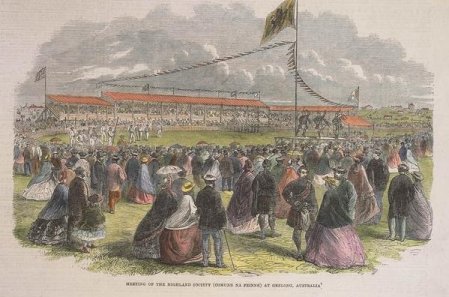As can be seen from
the above picture, the Scots, as a proud race, found a home in Australia
- and in and around Geelong. The starvation was largely at an end, as was
the harrassment of the Lairds and the English. Scots were free to
continue as they had been, free to wear the Tartans, to gather in celebration
of their new-found abilty to practice age-old gatherings as they chose.
Free to run their own small farms, run sheep, grow crops and fish the waters
of the wild southern coast of Australia that was not so different from
those at home. Many in the area had been in the final wave of Clearances,
and had been 'assisted' by the Highland and Island Association to leave
the Highlands. Many practiced the particularly Scottish form of Presbyterianism
in the Free Church in their new homeland. Norman McLean and his family
were no exception, embracing this local version of their old lives and
holding on to their Scottish roots.
Norman, though, like
many others, also chose to embrace (quite literally!) the other cultures
on offer by marrying first a girl from Ireland, then another from England.
The times were changing, and many events here would never have occurred
at home. Norman left his family to search for gold, but does not appear
to have been very successful. Norman worked for a time as a labourer, then
as a hostler and coachman for Dr King at the fine home that was later to
become Grace McKellor House in Geelong. He learned to be a snob (bootmaker),
soon after his second marriage, and continued in this trade for the rest
of his life.
Norman's first marriage,
in 1869, was to Sarah Kennedy, an Irish lass from County Tyrone. Their
family and details of their five children may be found here.
His first years with Sarah, and the place of birth of his two eldest children,
from 1870 to 1872, was at Rokewood, not far from Ballarat. The three younger
children were born in Geelong, and their births date the family there from
at least 1874. Sarah died of a post-parturition hemmorhage, after giving
birth to Roderick William, on 2nd October 1877.
Norman married again
to Lucy Jane Jones (nee Silk) in 1880. Details of Lucy's family's long
history in England and Australia may be found here.
Lucy had also been married previously, and had lost her first husband Edward
Jones in 1878. Sadly, their first child, named after Normans first wife
Sarah, died two days after her birth, when the family were again in Lancefield
- being "malformed and debilitated". Norman's occupation at this time was
given as 'labourer'. Their youngest child, Edward Finlay, in part named
after Lucy's first husband, was also to die very young - in 1915, at Shrapnel
Valley, Gallipolli, in Turkey aged 21. |
